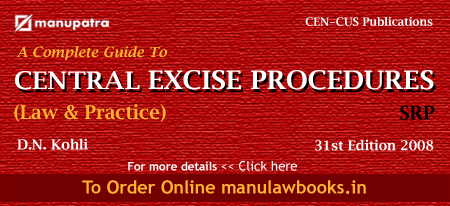|
India Centric Online Legal & Business Database
Bringing forth new efficiency and unparalleled results to research efforts.
| In This Issue |
[No.221] |
February
20, 2008 |
|
|
|
To keep you informed about the latest Legislative and Regulatory information manupatra.com publishes this e-roundup highlighting the recent changes brought about by the Notifications/Acts/Bills /Ordinances etc.
About manupatra.com
http://www.manupatra.com/ provides comprehensive and easy to use legal and related information over the Internet. Our database covers Central Laws, Judgments of Supreme Court and High Court (full text of the judgments from 1950 onwards ), Orders of Tribunals, Bills, Notifications, Circulars and more
Key features of manupatra are
 |
Content is derived from reliable primary and secondary sources |
 |
Database is updated on a daily basis |
 |
Electronic Ready Reckoner to view the judgments under a particular section of an Act / Subject |
 |
Powerful search engine with user friendly interfaces |
 |
Search in any one court/year or multiple courts/year |
 |
Hyper-linking of documents |
 |
Updated modules on WTO, Anti Dumping, Arbitration, Investment Destinations Abroad, Capital Markets, Taxation, Environment, Cyber & IT Laws, IPR, Corporate Laws, Industrial Policies, ForeignTrade, Forex & Banking and more
|
For subscription to manupatra.com or for more details please log onto http://www.manupatra.com/ or call us at 0120 2531811 or send an email to : contact@manupatra.com
If at any stage you wish to stop receiving the e-roundup please click here to unsubscribe.



|
|
Supreme
Court |
|
The Respondent was an employee of the New Bank of India. The said Bank was amalgamated with the Appellant bank. A chargesheet was issued against the Respondent. However, he reached the age of
superannuation. The Appellant-bank, relying on or on the basis of Regulation 20(3)(iii) of the National Bank (Officers') Service Regulations, 1979, continued the departmental proceedings against him, which was completed after his retirement. The Disciplinary Authority dismissed the Respondent from the service. An appeal filed by the Respondent before the Appellate Authority was dismissed. The Respondent was paid his provisional pension from the date of superannuation till the date of dismissal. The Respondent claimed that he was entitled to payment of provisional pension till the disposal of his appeal by the Appellate Authority. The Respondent filed a Writ Petition. A Single Judge of the High Court directed that the arrears of provisional pension be paid for the period during which the appeal was pending. The respondent preferred an appeal before the Division Bench. The
Division Bench of the High Court had dismissed the intra-Court appeal. Hence, the present appeal was filed by the appellant. The present Court held that services of an employee can be validly terminated only once. Only because an appeal has been provided against an order of dismissal from services, the same ipso facto would not mean that
the same would remain under animated suspension. If an officer is removed or dismissed from service under Regulation 4 of the (Discipline & Appeal) Regulations, the Bank need not take recourse to Regulation 48 of the Pension Regulations as Regulation 22 thereof would be attracted and his pensionary benefits could be forfeited. The appellant thus, not entitled to provisional pension as held by High Court. Impugned Judgment was accordingly set aside and appeal was allowed.
The Appellant, engaged in the manufacture of excisable goods, inter
alia, filed classification list of their products mentioned at Sr. No. 1(a) to (u) of the classification declaration with effect from 20.12.1996 claiming classification under Chapter Heading 8710 of the schedule to the Central Excise Tariff Act, 1985 (in short the 'Tariff Act'). The goods in the classification list were described as parts of tanks and other armoured and motorized fighting vehicles under Chapter Sub-Heading 8710.00 of the Tariff Act. The Tribunal held that goods were identifiable as goods under Chapter 8536.90. Hence, the present appeal was filed by the appellant. The court held that as per the Explanatory Notes to
HSN, the parts falling under Chapter Heading 8710 would be covered under the said chapter, provided they fulfill both the conditions i.e. they must be identifiable as being suitable for use solely or principally for such vehicles and that they must not be excluded by the provisions of Notes to Section
XVII. Since impugned goods fall under the category of excluded goods under Chapter Notes, even though they are used specifically, solely or principally with the armoured vehicles of Chapter Heading 8710. Thus, the goods are classifiable under Chapter Heading 8536.90 only as held by the Adjudicating Authority. The appeal was accordingly dismissed.
|
High Courts |
|
Bombay
Plaintiff is the registered proprietor of a trade mark, "VOLINI" in respect of medicinal and pharmaceutical preparations falling in class 5 of the Schedule to the Trade Marks Rules. Plaintiff filed an action of Trademark infringement on the ground that Defendant commenced marketing a product under the word mark "VONIGEL" which was similar to or identical with the mark of the Plaintiff visually, phonetically and structurally. Plaintiff alleged that the Defendant has copied the entire get up of the carton and the tube of the Plaintiff with an intention to deceive the unwary customer with imperfect recollection into confusing the mark of the Defendant for the mark of the Plaintiff. An application for interim relief and interlocutory injunction was also filed. Defendant contended that the mark VONIGEL not deceptively similar, word for word or letter for letter. Held, in considering the issue of deceptive similarity, the Court has to have due regard to the rival marks as a whole and to the impact which they would make on an ordinary and, as it is often said, unwary purchaser. To the average purchaser with an average intelligence, the mark VONIGEL must appear deceptively similar to the mark VOLINI. Average purchaser liable to be confused into assuming that the product under the mark VONIGEL which is sold by the Defendant is in fact, the product of the Plaintiff sold under the mark VOLINI. Words VOLINI and VONI are deceptively similar. Plaintiff has made out a prima facie case for the grant of interlocutory relief. Balance of convenience was in favour of the Plaintiff which was a prior user. Irreparable injury liable to be caused to the Plaintiff if interlocutory relief were to be refused. Interim relief granted..
-
Ghanshyam Mulchand Keshwani and Gurumukh Mulchand Keshwani v. State of Maharashtra, through Food Inspector & Supervisor, Food & Drug Administration, Maharashtra State, Chandrapur and Girish Joshi, Proprietor of M/s Kusum Products, Nagpur
Petitioner a retailer was charged for selling adulterated chilly powder by the Food Inspector on the basis of an inspection. Complaint was filed against the Petitioners and Respondent No.2 after obtaining consent from Joint Commissioner of Food and Drugs Administration. Hence, the Petitioner filed the present petition for quashing the criminal case. Petitioner contented that by virtue of Section 19(2) the retailers are protected against prosecution if they obtained a written warranty from the manufacturer in the prescribed form. Held, by virtue of Section 19 (2) if the accused were able to discharge the burden by proving that they are the retailers and they purchased food Article from a manufacturer under warranty in a prescribed form then they could be absolved from criminal liability. In the present case, the Petitioners has not only proved that they are retailers but also has produced the bill containing warranty about the quality of the chilly powder on the back of the bill. Further, the manufacturer has also been impleaded as Accused No.3. Had the manufacturer not been joined as co-accused, then perhaps it was necessary for the Petitioners to lead evidence in support of their defence. In view of these circumstances there is no force in the submission made by the learned APP that the Petitioners have not discharged the burden of proof lying on them. Material on record does not disclose any offence against the Petitioners and it would be an abuse of the process of law to continue the prosecution against the Petitioners. Criminal case against Petitioners quashed. Petition allowed.
|
PIB |
|
PIB Dated 15.02.2008 : Foreign Currency Exchangeable Bonds Scheme, 2008 issued to enable mechanism to permitting Indian companies to unlock a part of holding in group companies for meeting their financing requirements by issue of Exchangeable Bonds.
The salient features of the Scheme are as follows
:-
- According to the scheme Foreign Currency Exchangeable Bond is a bond expressed in foreign currency, the principal and interest in respect of which is payable in foreign currency, issued by an Issuing Company and subscribed to by a person who is a resident outside India in foreign currency and exchangeable into equity share of another company, to be called the Offered Company, in any manner, either wholly, or partly or on the basis of any equity related warrants attached to debt instruments.
-It provides that Issuing Company shall be part of the promoter group of the Offered Company and shall hold the equity share/s being offered at the time of issuance of Foreign Currency Exchangeable Bond.
- It provides that Offered Company shall be a listed company which is engaged in a sector eligible to receive Foreign Direct Investment and eligible to issue or avail of Foreign Currency Convertible Bond or External Commercial Borrowings.
-It is made mandatory for investment under the scheme to comply with the Foreign Direct Investment policy as well as the External Commercial Borrowing Policy requirements.
- It is provided that the proceeds of Foreign Currency Exchangeable Bond can be invested by the issuing company in the promoter group companies and shall be used in accordance with end uses prescribed under the External Commercial Borrowings policy. The promoter group company receiving such investments will not be permitted to utilize the proceeds for investments in the capital market or in real estate in India.
- It provides that proceeds of Foreign Currency Exchangeable Bond can be invested by the issuing company in the promoter group companies and shall be used in accordance with end uses prescribed under the External Commercial Borrowings policy. The promoter group company receiving such investments will not be permitted to utilize the proceeds for investments in the capital market or in real estate in India.
-At the same time it provides that proceeds of Foreign Currency Exchangeable Bond can also be invested by the issuing company overseas by way of direct investment including in Joint Ventures or Wholly Owned Subsidiaries subject to the existing guidelines on Indian Direct Investment in Joint Ventures or Wholly Owned Subsidiaries abroad.
- It is provided that the rate of interest payable on Foreign Currency Exchangeable Bond and the issue expenses incurred in foreign currency shall be within the all in cost ceiling as specified by Reserve Bank of India under the External Commercial Borrowings policy.
-
According to the scheme at the time of issuance of Foreign Currency Exchangeable Bond the exchange price of the offered listed equity shares shall be as per FCEB Scheme.
-
It provides minimum maturity of the Foreign Currency Exchangeable Bond to be five years for purposes of redemption. The exchange option can be exercised at any time before redemption.
-
It provides that proceeds of the Foreign Currency Exchangeable Bond shall be retained and/or deployed overseas in accordance with the policy for the proceeds of External Commercial Borrowings.
-
It provides that Tax treatment on Exchangeable Bonds would be as per FCEB Scheme.
|
RBI |
|
DNBS
Circular No:
DNBS/PD(MGC) C.C. 1 / 03.11.001 /2007-08 Dated 15.02.2008 The Bank has finalised Guidelines on Registration and Operations of Mortgage Guarantee Company and Prudential Norms and Investment Norms as applicable to Mortgage Guarantee Company. Reserve Bank of India has issued 'Mortgage Guarantee Company (Reserve Bank) Guidelines, 2008' for compliance by every non-banking financial company undertaking the business of Mortgage Guarantee as defined by the Guideline. These guidelines provide a framework for the registration and operation of mortgage guarantee companies in India. It provides for procedure and formalities to be adopted by the mortgage guarantee company for Registration with the Reserve Bank of India and Essential features of a mortgage guarantee. 'Mortgage Guarantee Companies Investment (Reserve Bank) Directions, 2008' are also issued by the Reserve Bank of India for the purpose of enabling the Bank to regulate the credit system to the advantage of the country. The provisions of direction are mandatory and will apply to every Mortgage Guarantee Company which has been granted Certificate of Registration by the Reserve Bank of India.
|
Ministry of Commerce and Industry |
|
Industrial Policy and Promotion
Notification No: SO246 (E) Dated 05.02.2008 List of items reserved for exclusive manufacture in small scale sector is shorten by the Central Government, after considering the recommendations made to it by the Advisory Committee on reservation. Central Government has directed amendment in the specified notification in exercise of the powers conferred by section 29B of the Industries (Development and Regulation) Act, 1951.
|
| International Legal Cases and News |
|
Cases
Question in the present case is that with whom the child should live. Mother seeking to re-litigate residence issues. The father is aged 46 years. The father resides in Sydney, NSW. The mother is aged 35 years. The parties' relationship broke down and they separated in February 2001 and the child remained primarily in her mother's care. The mother remarried and has a son with her husband. The mother relocated to Tasmania with the child, her husband and her son. The history of the litigation between the parties is lengthy and complex. The father is critical of the child's relationship with her mother, brother and stepfather. The mother is critical of the father's failure to exercise contact with the child until December 2006. These reasons need to be balanced against the benefit to the child of allowing the litigation between her parents to continue. Held that at the moment there is a relationship between the child and her father. If the father is unsuccessful in his application there is a risk that his relationship with the child will deteriorate further as he will be unable to afford the cost of spending time with the child for more frequent but shorter periods of time, as sought by the mother. The question is does this benefit outweigh the possible harm to the child of allowing the litigation to continue. It is more important to protect the child from the adverse consequences of allowing this litigation to continue. Fathers application allowed.
The appellant sought review of a decision of the Commissioner of Police to issue a fortification removal notice in the Supreme Court of Western Australia. In question was the possible invalidity of Section 76 the Corruption and Crime Commission Act 2003. The appellant contended that Section 76(2) was invalid, but that the remainder of the section was valid. Section 76(2) of the Corruption and Crime Commission Act 2003 provided that the Commissioner could identify any information provided to the Supreme Court for the purposes of review proceedings as confidential "if its disclosure might prejudice the operations of the Commissioner" with consequences for the use and disclosure of the information. In providing for the exemption of certain information from disclosure, Section 76(2) does not so affect the character of the Supreme Court of Western Australia that it does not satisfy the minimum requirements of independence from the executive, and impartiality, which are founded upon the constitutional description "Supreme Court of [a] State" in Ch III. Nor does s 76(2) create any incompatibility with the Supreme Court's role under the Constitution as a potential repository of federal jurisdiction. The challenge to the validity of Section 76 (2)
fails.
News
A foreign student Steven Kazmierczak made an open fire at students in Cole Hall at Northern Illinois University on 14th February. Before the shooting he called his girlfriend to say goodbye. Jessica Baty,
his girlfriend told the CNN that he called her around midnight and told her to forget him. She denied that his recent behavior was unusual. She also mentioned that on the day of shooting she received a package containing a goodbye note, a cell phone and two textbooks from him.
Fidel Castro, a Cuban leader at 81 announced his retirement after not appearing in public for almost 19 months after being stricken by an undisclosed illness, where he was leading the state for 49years. His brother, Raul Castro might get nominated by the National Assembly or legislature in the place of president of Castro. The title of commander-in-chief was created in 1958 for him as the leader of a guerrilla movement that swept down from the mountains of eastern Cuba to overthrow U.S.-backed dictator Fulgencio
Batista.
|
|
|
Disclaimer |
|
(1) While all reasonable care has been taken to ensure that the information provided in the "round up" and on the website is fair and accurate the company and its promoters and employees shall not in any way be responsible for the consequences of any action taken on the basis of reliance upon the contents of this "round up". |
|
(2) This is not a Spam mail. You have received this mail because you have either requested for it or someone must have suggested your name under our various referral programs. Since India has no anti-spamming law, we refer to the US directive, which states that a mail cannot be considered Spam if it contains the sender's contact information, which this mail does. In case this mail doesn't concern you, please unsubscribe from mailing list.
 Feedback Feedback
|
|
![]()


